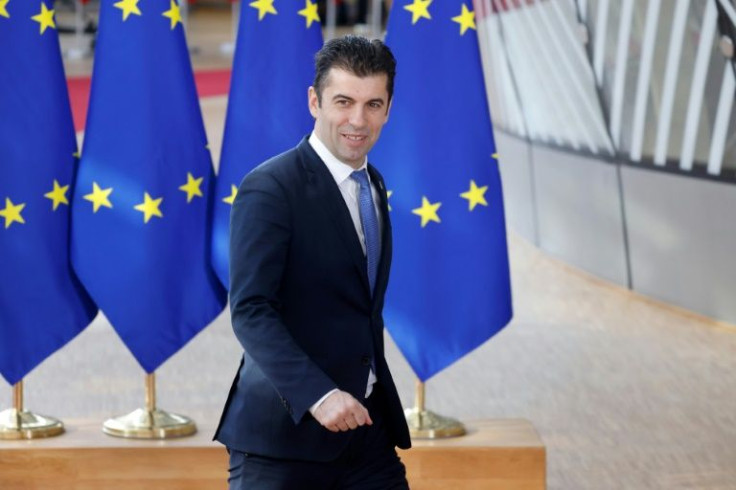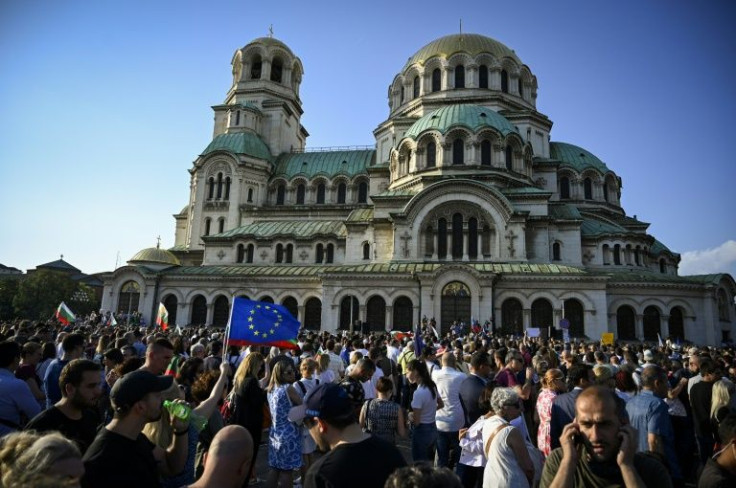Fresh Turmoil For Bulgaria As Govt Loses Confidence Vote
Bulgaria's coalition government collapsed Wednesday after just six months when it lost a vote of confidence among lawmakers, bringing fresh political turmoil and the increased likelihood of an early general election.
But analysts say there is no guarantee that another national vote in this country of 6.5 million people, which last year went through three such polls, would end its political instability.
In the most recent election last November, the party of liberal Kiril Petkov came out ahead and formed an unwieldy coalition government with three other parties.
An energetic, pro-European prime minister, Petkov promised to end Bulgaria's endemic corruption after a decade of rule by the controversial conservative Boyko Borisov.
But cracks in the coalition began to appear soon after Russia's invasion of Ukraine, and earlier this month the anti-establishment ITN party led by entertainer Slavi Trifonov withdrew its support.
Borisov's conservative GERB party swiftly filed a no-confidence motion citing "the failure of the government's economic and financial policy" as consumer inflation soared.
On Wednesday evening, 123 lawmakers in the 240-seat chamber voted in favour of the motion, two more than it needed to succeed, while 116 voted against. One member of parliament missed the vote through illness.

It was the first time a Bulgarian government had ever been toppled by such a vote.
"It was an honour for me to lead a government overthrown by Borisov, (Delyan) Peevski, Trifonov and (Eleonora) Mitrofanova," Petkov told lawmakers, referring to a well-known oligarch and the Russian ambassador to Sofia as well as the other party leaders.
"They did not understand that this is not the way to win the Bulgarian people," Petkov said of his opponents, before promising to continue fighting for Bulgaria to be a "normal" European state "without mafia".
Outside parliament, a small rally of government opponents was followed by a bigger gathering of thousands of Petkov supporters.
"It is very discouraging that this vote succeeded but we remain here until we win the next election. What's most important is to end the plunder," 22-year-old brewer and Petkov supporter Marin Yorkishev told AFP, blaming the opposition for "another political crisis".
The Ukraine conflict has inflamed divisions in Bulgaria, a country with strong historical ties to Moscow.

Despite Bulgaria's heavy dependence on Russian gas and oil, Petkov opposed Moscow's demand to open a ruble account to pay for Russian gas -- a response to European Union sanctions.
The decision caused friction in the government and the country faced a cut in supplies in response.
Another source of tension was Ukraine's appeal for arms.
While most of the parties in Petkov's government were ready to authorise such deliveries, the Socialists -- also part of the ruling coalition -- remained opposed.
The final straw however came from the EU's drive to settle longstanding historical and cultural disputes between Bulgaria and neighbouring North Macedonia.
It was Petkov's advocacy of rapprochement with Skopje that the ITN says prompted them to quit the coalition.
President Rumen Radev will now have three attempts to see if any party can form a governing majority among lawmakers.
Petkov's party is expected to receive the first mandate from Radev to try to gather a majority, followed by GERB and then another party of Radev's choosing.
Petkov told the Bulgarian Nova television channel that he intends to present "essentially" the same cabinet to parliament for approval in spite of Wednesday evening's events.
If no workable majority can be found, politicians will go back to campaigning for elections that would have to be held within two months.
According to political scientist Daniel Smilov from the Centre for Liberal Strategies think tank, the only chance of cobbling together a majority in the current parliament lies with Petkov.
Early elections would most likely lead to a "fragmented parliament", Smilov told AFP.
But "at the same time, there is a very serious mobilisation in support of (Petkov), which, if utilised in an election campaign, could lead to a surprise".
© Copyright AFP 2024. All rights reserved.







